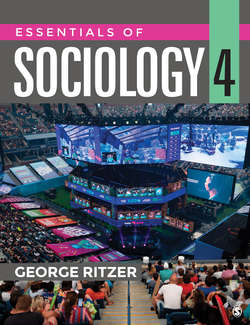Читать книгу Essentials of Sociology - George Ritzer - Страница 109
На сайте Литреса книга снята с продажи.
Countercultures
ОглавлениеCountercultures are groups that not only differ from the dominant culture but also adhere to norms and values that may be incompatible with those of the dominant culture. They may, in fact, consciously and overtly act in opposition to the dominant culture. The term counterculture was introduced by Theodore Roszak ([1968] 1995) in the late 1960s in reference to hippies, antiwar activists, and radical students.
Computer hackers are a contemporary example of a counterculture. Many hackers simply seek to show their technical mastery of computers through relatively benign actions, such as writing free computer software, but a minority are devoted to subverting authority and disrupting the internet, and some are involved in stealing personal identification data (identity theft) and money (Alleyne 2018). They may write malicious code in order to interrupt or even shut down the normal operations of computers. In one famous case in 1988, Robert Tappan Morris unleashed what was thought to be the first worm that slowed down thousands of computers, making many of them unusable. Since then, many attempted and successful break-ins have threatened government and corporate computer systems (e.g., the Equifax break-in of 2017); the hackers’ goal has been to steal secret or personal information (like consumer credit data in the case of Equifax). A rash of break-ins into corporate computers was aimed at stealing credit card numbers and account information. For example, the account information of 56 million Home Depot customers was compromised; information on 40 million Target accounts had been hacked the year before (Perlroth 2014). Hackers also exposed the names of 30 million people who had accounts with Ashley Madison. This was particularly troublesome to the account holders because those who participated on the Ashley Madison website were interested in having adulterous affairs. The site’s slogan was “Life is short; have an affair” (McPhate 2016). Personal accounts have also been hacked and locked until the account holders paid ransom demanded by the hackers (Simone 2015). Hacking became a huge public issue in late 2016 when the Russians were caught hacking the accounts of Hillary Clinton and her supporters during the U.S. presidential campaign. Many believe that the Russians’ goal was to help Donald Trump win the election (Lipton, Sanger, and Shane 2016). While there is clear evidence that the Russians did hack Clinton’s e-mail account, as well as those of others associated with her campaign, and intervene in the 2016 election in other ways, preliminary analysis of the 2019 Mueller Report did not find sufficient evidence to clear Trump of the charge of colluding with the Russians in this effort. However, we can expect more revelations about this in the years to come as at least some of the report becomes public.
In the realm of consumption, an important contemporary counterculture is formed by those associated with or sympathetic to the “voluntary simplicity” movement (Elgin 2010; Pelikán, Galcanova, and Kala, 2017). Sociologist Juliet Schor (1993, 1998) has critiqued the dominant American culture’s emphasis on what she calls “work and spend.” That is, we are willing to work long hours so that we can spend a great deal on consumption and live an ever-more elaborate lifestyle. In addition, Schor (2005) points out the ways in which our consumer culture has led to the commercialization of childhood, with advertising pervading all aspects of children’s lives. As a countercultural alternative, she suggests that we both work less and spend less and instead devote ourselves to more meaningful activities. Living a simpler life means avoiding overconsumption, minimizing the work needed to pay for consumption, and doing less harm to the environment.
Globalization, especially economic globalization, has also spawned a number of very active countercultural groups. They are not necessarily antiglobalization, but they favor alternative forms of globalization (Kahn and Kellner 2007; Obara-Minnitt 2014; Pleyers 2010). In fact, many of them are part of the process of globalization. The World Social Forum (WSF) was created in 2001 following a series of antiglobalization protests, particularly one in Seattle in 1999. Its members come from all over the world. The WSF’s slogan is “Another world is possible.” That other world would be less capitalistic. It would also allow for more democratic decision-making on matters that affect large portions of the world’s population. Those who accept this kind of perspective are clearly part of a counterculture. They oppose the global spread of the dominant capitalist culture that prioritizes maximizing profits over democratic decision-making.
